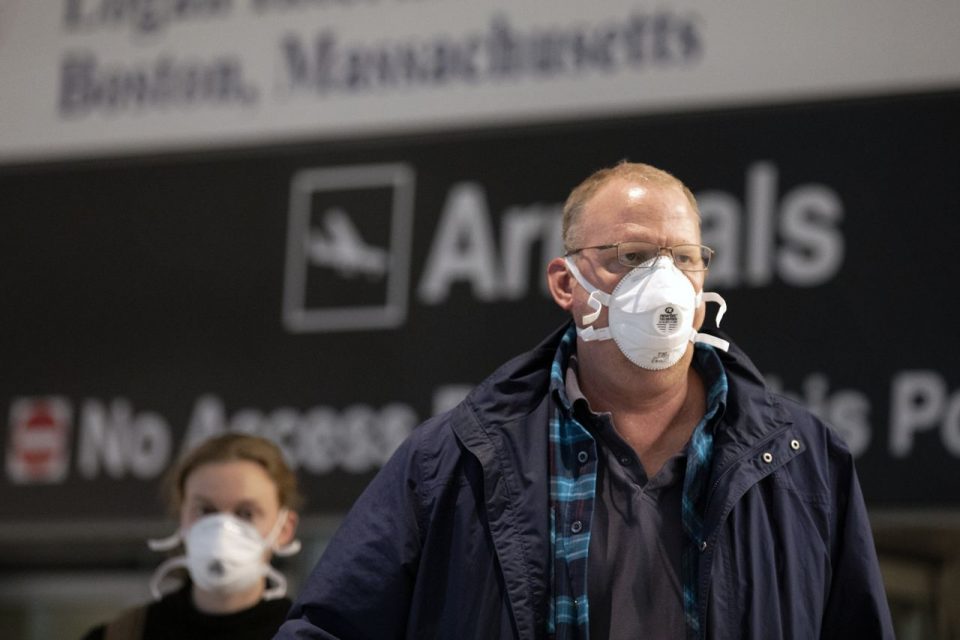The U.S. Centers for Disease Control and Prevention (CDC) issued new guidance this week strongly recommending passengers and operators aboard public transportation mask up amid the coronavirus pandemic, though the agency did not go so far as to issue a mandate requiring face coverings.
The CDC’s guidance was published to the federal agency’s website Monday and was directed to passengers on airplanes, ships, ferries, trains, subways, buses, taxis and ride-sharing services as well as crews, drivers, conductors and other workers tasked with running those modes of transportation.
“This guidance provides a strong recommendation for wearing of masks by passengers on and operators of conveyances to prevent spread of the virus that causes COVID-19,” the agency said. “Face masks help prevent people who have COVID-19, including those who are pre-symptomatic or asymptomatic, from spreading the virus to others.”
The recommendations from the CDC come following pressure from the airline industry amid soaring cases of coronavirus in the United States and strong evidence that supports face coverings’ effectiveness in staving off transmission of the virus, The Washington Post reported.
However, the newspaper reported, the agency’s guidance falls short of what transportation industry leaders were seeking.
Many countries, states and local authorities – as well as transportation partners, such as airlines, train and bus operators – have taken it upon themselves to implement mask requirements on public transportation and boarding terminals to reduce the spread of the virus, the CDC noted.
While the federal government has been hesitant to issue any such mandates, Massachusetts and other states, as well as a handful of cities and towns in the commonwealth, have put in place their own mask-wearing policies.
In May, a statewide face covering order went into effect throughout the commonwealth, requiring workers and customers of open businesses and other organizations to mask up.
Under the order, residents must also wear a mask or face covering at all times when using any means of public transportation or mass transit.
According to the website of the Massachusetts Bay Transportation Authorities (MBTA) – the state agency that operates subways, trains, buses and ferries across Greater Boston and other areas of the commonwealth – all riders and employees are required to wear face coverings while aboard the T.
Any person not wearing a mask due to a medical condition will not be denied service, the MBTA noted.
Violators of the order may face a $300 fine, though Gov. Charlie Baker noted enforcement will be left up to cities and towns. Those with medical conditions that prevent them from wearing a mask and children under the age of 2 are exempt from the order.
Several communities have strengthened the governor’s face covering order by implementing their own municipal mask requirements in public spaces.
The cities or towns that issued stricter municipal face covering requirements include Northampton, Cambridge and Somerville, Brookline and others.
The CDC pointed out traveling on public transportation heightens a person’s risk of contracting and transmitting the viral respiratory infection by bringing passengers in close contact with one another, often for prolonged periods, and exposing them to frequently touched surfaces.
Air travel, for instance, frequently requires spending time in security lines and busy terminals, the agency noted.
At Boston Logan International Airport, face coverings are required for all employees. Passengers are strongly encouraged to wear them and are mandated to mask up when social distancing is not possible.
“Social distancing may be difficult if not impossible on buses and flights,” the CDC said. “People may not be able to distance themselves by the recommendation to be at least 6 feet from individuals seated nearby or those standing in or passing through the aisles on airplanes, trains or buses.”
There are also concerns surrounding interstate travel, that more lengthy journeys via public transportation will help spread the virus far beyond communities or states where cases originate, according to the agency.
“Given how interconnected most transportation systems are across the nation and the world, local transmission can grow quickly into interstate and international transmission when infected persons travel on public conveyances without wearing a mask and with others who are not wearing masks,” the CDC said.
The CDC’s guidance come as a new poll shows 59% of Americans back mask mandates to curb the rapidly increasing spread of COVID-19 in the U.S.
Women back face covering restrictions by 70%, while 68% of voters over the age of 65 support such mandates. Only 30% of Republican respondents said they support a national mask mandate, the Siena College and The New York Times poll showed.
Republican incumbent President Donald Trump, who contracted coronavirus earlier this month, has openly mocked mask-wearing and has even made fun of his Democratic challenger, former Vice President Joe Biden, for wear a face covering.
However, the CDC pointed out, the wide use of masks helps protect those at higher risk of severe illness from COVID-19 as well as public transportation workers who frequently come in close contact with other people in airports, seaports or other docks, bus terminals and train stations.
“Using masks along with other preventive measures, including social distancing, frequent hand hygiene, and cleaning and disinfecting frequently touched surfaces, is one of the most effective strategies available for reducing COVID-19 transmission,” the agency said.
Related Content:


